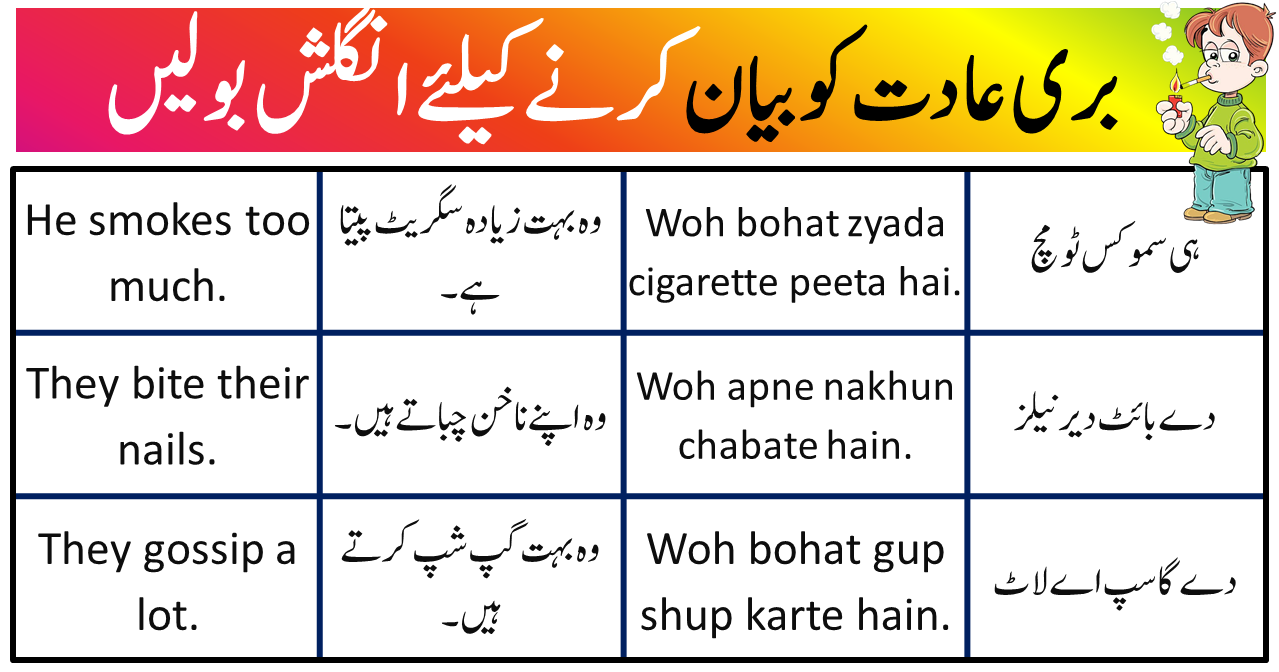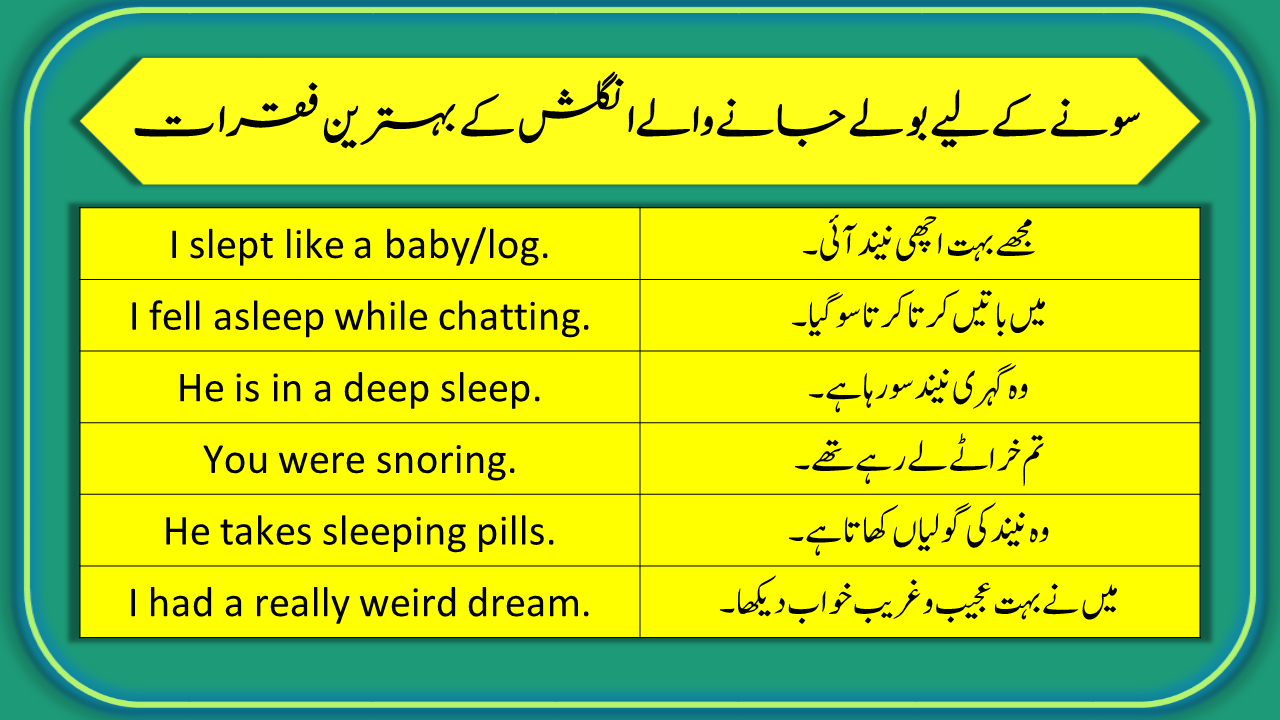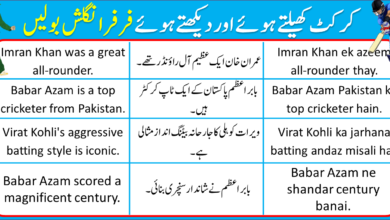74+ Common Sentences About Bad Habits In English & Urdu
Bad habits are things we do that can harm our bodies, minds, or feelings. Sometimes, we do them without realizing and find it tough to quit. For instance, biting your nails, delaying tasks, or constantly checking your phone can ruin your day.
List of 74+ Sentences About Bad Habits in English & Urdu
In this post, we’ll look at some common English phrases about bad habits and their translations in Urdu. By learning these phrases, you’ll be able to understand these habits better and talk about them in both English and Urdu. This will make it easier to talk about them with others.
By learning these phrases, you’ll not only improve your understanding of bad habits but also enhance your language skills in both English and Urdu. This will make it easier to communicate about these habits with others, allowing you to share your experiences and seek support from others who may be facing similar challenges.
Sentences About Bad Habits in English & Urdu – (1-25)
In this guide, we will talk about 25 sentences that explain bad habits in English and Urdu. Each sentence will help you understand how to say things about bad habits in both languages. This guide is for people who know English or Urdu and want to improve their communication skills about bad habits in different languages.
| He smokes too much. | وہ بہت زیادہ سگریٹ پیتا ہے۔ | Woh bohat zyada cigarette peeta hai. | ہی سموکس ٹو مچ |
| She skips breakfast often. | وہ اکثر ناشتہ چھوڑ دیتی ہے۔ | Woh aksar nashta chor deti hai. | شی اسکپس بریکفاسٹ آفٹن |
| They bite their nails. | وہ اپنے ناخن چباتے ہیں۔ | Woh apne nakhun chabate hain. | دے بائٹ دیر نیلز |
| He often eats junk food. | وہ اکثر فاسٹ فوڈ کھاتا ہے۔ | Woh aksar fast food khata hai. | ہی آفٹن ایٹس جنک فوڈ |
| She spends too much time on her phone. | وہ اپنے فون پر بہت زیادہ وقت گزارتی ہے۔ | Woh apne phone par bohat zyada waqt guzarti hai. | شی اسپینڈس ٹو مچ ٹائم آن ہر فون |
| They don’t exercise regularly. | وہ باقاعدگی سے ورزش نہیں کرتے۔ | Woh baqaidgi se warzish nahi karte. | دے ڈونٹ ایکسرسائز ریگیولرلی |
| She watches too much TV. | وہ بہت زیادہ ٹی وی دیکھتی ہے۔ | Woh bohat zyada TV dekhti hai. | شی واچز ٹو مچ ٹی وی |
| He eats late at night. | وہ رات کو دیر سے کھانا کھاتا ہے۔ | Woh raat ko der se khana khata hai. | ہی ایٹس لیٹ ایٹ نائٹ |
| They gossip a lot. | وہ بہت گپ شپ کرتے ہیں۔ | Woh bohat gup shup karte hain. | دے گاسپ اے لاٹ |
| He often lies about small things. | وہ اکثر چھوٹی چھوٹی باتوں پر جھوٹ بولتا ہے۔ | Woh aksar choti choti baton par jhoot bolta hai. | ہی آفٹن لائز اباؤٹ سمال تھنگز |
| She neglects her health. | وہ اپنی صحت کی پرواہ نہیں کرتی۔ | Woh apni sehat ki parwah nahi karti. | شی نیگلیکٹس ہر ہیلتھ |
| It makes him lazy. | یہ اسے سست بناتا ہے۔ | Yeh use sust banata hai. | اِٹ میکس ہم لیزی |
| We should avoid overeating. | ہمیں زیادہ کھانے سے بچنا چاہئے۔ | Hamein zyada khane se bachna chahiye. | وی شُڈ اووائڈ اوورایٹنگ |
| You waste too much water. | تم بہت زیادہ پانی ضائع کرتے ہو۔ | Tum bohat zyada pani zaya karte ho. | یو ویسٹ ٹو مچ واٹر |
| They rarely clean their room. | وہ اپنا کمرہ شاذ و نادر ہی صاف کرتے ہیں۔ | Woh apna kamra shaz o nadir hi saaf karte hain. | دے ریرلی کلین دیر روم |
| His spending is out of control. | اس کا خرچ کنٹرول سے باہر ہے۔ | Us ka kharch control se bahar hai. | ہز اسپینڈنگ از آؤٹ آف کنٹرول |
| Her screen time is excessive. | اس کا اسکرین ٹائم زیادہ ہے۔ | Us ka screen time zyada hai. | ہر اسکرین ٹائم از ایکسیسو |
| What causes him to be so impatient? | کیا وجہ ہے کہ وہ اتنا بے صبرا ہوتا ہے؟ | Kya wajah hai ke woh itna be sabra hota hai? | واٹ کازز ہم ٹو بی سو امپیشنٹ |
| Why do they stay up so late? | وہ اتنی دیر تک کیوں جاگتے ہیں؟ | Woh itni der tak kyun jagte hain? | وائی ڈو دے اسٹے اپ سو لیٹ |
| Could you stop biting your lips? | کیا تم اپنے ہونٹ چبانا بند کر سکتے ہو؟ | Kya tum apne hont chabana band kar sakte ho? | کُڈ یو اسٹاپ بائٹنگ یور لپس |
| Would it be hard to quit smoking? | کیا سگریٹ پینا چھوڑنا مشکل ہوگا؟ | Kya cigarette peena chhodna mushkil hoga? | وُڈ اِٹ بی ہارڈ ٹو کوئٹ اسموکنگ |
| How can we improve our habits? | ہم اپنی عادتوں کو کیسے بہتر بنا سکتے ہیں؟ | Hum apni aadaton ko kaise behtar bana sakte hain? | ہاؤ کین وی امپروو آور ہیبٹس |
| When will you start exercising? | تم ورزش کب شروع کرو گے؟ | Tum warzish kab shuru karo ge? | وین وِل یو اسٹارٹ ایکسرسائزنگ |
| Will they ever learn to be punctual? | کیا وہ کبھی وقت کی پابندی سیکھیں گے؟ | Kya woh kabhi waqt ki pabandi seekhain ge? | وِل دے ایور لرن ٹو بی پنکچوئل |
| Do you often forget to drink water? | کیا تم اکثر پانی پینا بھول جاتے ہو؟ | Kya tum aksar pani peena bhool jate ho? | ڈو یو آفٹن فورگیٹ ٹو ڈرنک واٹر |
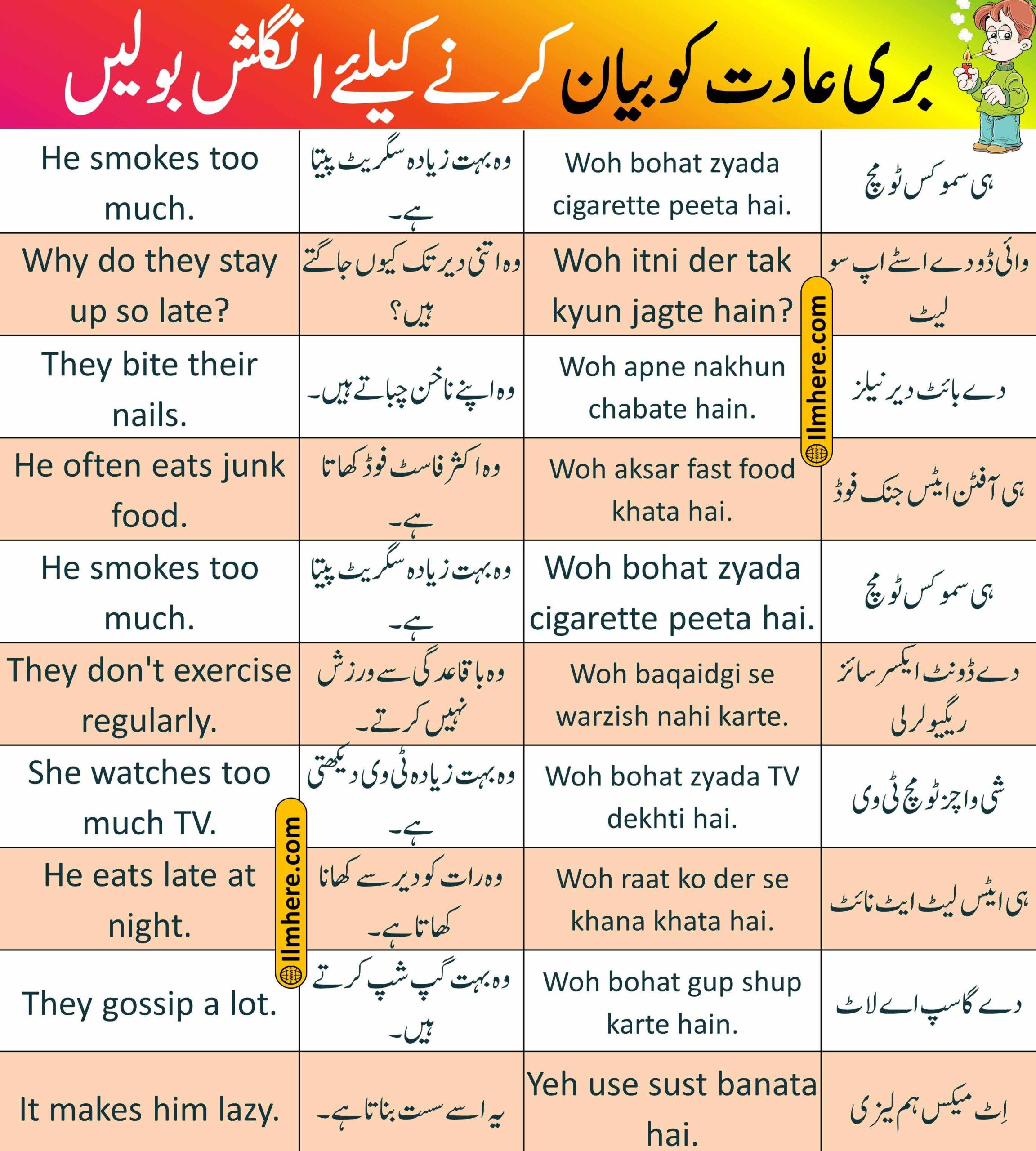
Sentences About Bad Habits in English & Urdu – (26-50)
In this guide, we’ll discuss another 25 sentences that describe bad habits in English and Urdu. Each sentence will teach you how to talk about bad habits in both languages. This guide is designed for English or Urdu speakers who wish to enhance their ability to discuss bad habits in multiple languages.
| Does he realize his mistakes? | کیا وہ اپنی غلطیوں کا احساس کرتا ہے؟ | Kya woh apni ghaltiyon ka ehsas karta hai? | ڈز ہی ریئلائز ہز مسٹیکس |
| Did she apologize for being late? | کیا اس نے دیر سے آنے پر معافی مانگی؟ | Kya us ne der se aane par maafi mangi? | ڈِڈ شی اپولوجائز فور بیئنگ لیٹ |
| He should cut down on his sugar intake. | اسے اپنی چینی کی مقدار کم کرنی چاہئے۔ | Usay apni cheeni ki miqdar kam karni chahiye. | ہی شُڈ کٹ ڈاؤن آن ہز شوگر انٹیک |
| She could spend less time on social media. | وہ سوشل میڈیا پر کم وقت گزار سکتی ہے۔ | Woh social media par kam waqt guzar sakti hai. | شی کُڈ اسپینڈ لیس ٹائم آن سوشل میڈیا |
| It would help if he organized his schedule. | اگر وہ اپنا شیڈول منظم کرے تو بہتر ہوگا۔ | Agar woh apna schedule munazzam kare to behtar hoga. | اِٹ وُڈ ہیلپ اِف ہی آرگنائزڈ ہز اسکیڈیول |
| We must stop littering the environment. | ہمیں ماحول کو گندا کرنا بند کرنا چاہئے۔ | Hamein mahol ko ganda karna band karna chahiye. | وی مسٹ اسٹاپ لِٹرنگ دی اِنوائرنمنٹ |
| You need to manage your time better. | تمہیں اپنے وقت کا بہتر انتظام کرنا چاہئے۔ | Tumhein apne waqt ka behtar intezam karna chahiye. | یو نیڈ ٹو منیج یور ٹائم بیٹر |
| They should respect others’ privacy. | انہیں دوسروں کی رازداری کا احترام کرنا چاہئے۔ | Unhein dusron ki raazdari ka ehteram karna chahiye. | دے شُڈ ریسپیکٹ اَدرز پرائیویسی |
| Their constant complaining is annoying. | ان کی مسلسل شکایت کرنا پریشان کن ہے۔ | Un ki musalsal shikayat karna pareshan kun hai. | دیر کانسٹنٹ کمپلیننگ از انوائنگ |
| His habit of interrupting is rude. | اس کی بات کاٹنے کی عادت بدتمیزی ہے۔ | Us ki baat katne ki aadat badtameezi hai. | ہز ہیبٹ آف انٹرپٹنگ از رود |
| Why does he always show up late? | وہ ہمیشہ دیر سے کیوں آتا ہے؟ | Woh hamesha der se kyun aata hai? | وائی ڈز ہی آلویز شو اَپ لیٹ |
| You should not rely on fast food. | تمہیں فاسٹ فوڈ پر انحصار نہیں کرنا چاہئے۔ | Tumhein fast food par inhasar nahi karna chahiye. | یو شُڈ ناٹ ریلائی آن فاسٹ فوڈ |
| Could we all try to be more eco-friendly? | کیا ہم سب ماحول دوست بننے کی کوشش کر سکتے ہیں؟ | Kya hum sab mahol dost banne ki koshish kar sakte hain? | کُڈ وی آل ٹرائی ٹو بی مور ایکو-فرینڈلی |
| Would you mind not talking during the movie? | کیا آپ فلم کے دوران بات کرنا بند کریں گے؟ | Kya aap film ke doraan baat karna band karein ge? | وُڈ یو مائنڈ ناٹ ٹاکنگ ڈیورنگ دی مووی |
| How can he improve his focus? | وہ اپنی توجہ کیسے بہتر کر سکتا ہے؟ | Woh apni tawajjuh kaise behtar kar sakta hai? | ہاؤ کین ہی امپروو ہز فوکس |
| When will they stop using plastic bags? | وہ پلاسٹک کے بیگ کب بند کریں گے؟ | Woh plastic ke bag kab band karein ge? | وین وِل دے اسٹاپ یوزنگ پلاسٹک بیگز |
| Will you try to be more punctual? | کیا تم زیادہ وقت کی پابندی کرنے کی کوشش کرو گے؟ | Kya tum zyada waqt ki pabandi karne ki koshish karo ge? | وِل یو ٹرائی ٹو بی مور پنکچوئل |
| Shall we start eating healthier? | کیا ہم صحت بخش کھانا شروع کریں؟ | Kya hum sehat bakhsh khana shuru karein? | شیل وی اسٹارٹ ایٹنگ ہیلتھیئر |
| Did he apologize for his behavior? | کیا اس نے اپنے رویے پر معافی مانگی؟ | Kya us ne apne rawaiye par maafi mangi? | ڈِڈ ہی اپولوجائز فور ہز بیہیویر |
| He often forgets to say thank you. | وہ اکثر شکریہ کہنا بھول جاتا ہے۔ | Woh aksar shukriya kehna bhool jata hai. | ہی آفٹن فورگیٹس ٹو سے تھینک یو |
| She should reduce her caffeine consumption. | اسے اپنی کیفین کی کھپت کم کرنی چاہئے۔ | Usay apni caffeine ki khapat kam karni chahiye. | شی شُڈ ریڈیوس ہر کیفین کنسمپشن |
| It would be better if he slept earlier. | بہتر ہوگا اگر وہ جلدی سویا کرے۔ | Behtar hoga agar woh jaldi soya kare. | اِٹ وُڈ بی بیٹر اِف ہی سلیپٹ ارلیئر |
| We must not waste food. | ہمیں کھانا ضائع نہیں کرنا چاہئے۔ | Hamein khana zaya nahi karna chahiye. | وی مسٹ ناٹ ویسٹ فوڈ |
| You need to control your temper. | تمہیں اپنے غصے پر قابو پانا چاہئے۔ | Tumhein apne ghusse par qabu paana chahiye. | یو نیڈ ٹو کنٹرول یور ٹیمپر |

Sentences About Bad Habits in English & Urdu – (51-75)
Here is the final set of sentences about bad habits in English and Urdu. These sentences will help you learn how to discuss bad habits in both languages. This guide is for people who speak English or Urdu and want to improve their ability to talk about bad habits in different languages
| They often ignore important emails. | وہ اکثر اہم ای میلز کو نظرانداز کرتے ہیں۔ | Woh aksar aham emails ko nazarandaz karte hain. | دے آفٹن اِگنور امپورٹنٹ ایمیلز |
| His tendency to overthink causes stress. | اس کی زیادہ سوچنے کی عادت تناؤ کا باعث بنتی ہے۔ | Us ki zyada sochne ki aadat tanao ka baais banti hai. | ہز ٹینڈنسی ٹو اوورتھنک کازز اسٹریس |
| What stops him from keeping promises? | کیا چیز اسے وعدے نبھانے سے روکتی ہے؟ | Kya cheez usay wade nibhane se rokti hai? | واٹ اسٹاپس ہم فرام کیپنگ پرامسز |
| You should not be so judgmental. | تمہیں اتنا فیصلہ کن نہیں ہونا چاہئے۔ | Tumhein itna faisla kun nahi hona chahiye. | یو شُڈ ناٹ بی سو ججمنٹل |
| Would they consider reducing screen time? | کیا وہ اسکرین ٹائم کم کرنے پر غور کریں گے؟ | Kya woh screen time kam karne par ghor karein ge? | وُڈ دے کنسیڈر ریڈیوسنگ اسکرین ٹائم |
| How can she manage her finances better? | وہ اپنی مالیات کو کیسے بہتر طریقے سے سنبھال سکتی ہے؟ | Woh apni maaliyat ko kaise behtar tareeqay se sambhal sakti hai? | ہاؤ کین شی منیج ہر فائنانسز بیٹر |
| When will you start taking your health seriously? | تم اپنی صحت کو کب سنجیدہ لو گے؟ | Tum apni sehat ko kab sanjeeda lo ge? | وین وِل یو اسٹارٹ ٹیکنگ یور ہیلتھ سیریئسلی |
| Shall we try to be more organized? | کیا ہم زیادہ منظم ہونے کی کوشش کریں؟ | Kya hum zyada munazzam hone ki koshish karein? | شیل وی ٹرائی ٹو بی مور آرگنائزڈ |
| Do they chew gum loudly in public? | کیا وہ عوام میں زور سے چیونگم چباتے ہیں؟ | Kya woh awam mein zor se chewing gum chabate hain? | ڈو دے چیو گم لاؤڈلی اِن پبلک |
| Does she often use her phone while driving? | کیا وہ اکثر ڈرائیونگ کے دوران فون استعمال کرتی ہے؟ | Kya woh aksar driving ke doraan phone istemal karti hai? | ڈز شی آفٹن یوز ہر فون وائل ڈرائیونگ |
| Did he finally quit the habit of swearing? | کیا اس نے آخر کار گالیاں دینے کی عادت چھوڑ دی؟ | Kya us ne aakhir kaar galiyan dene ki aadat chhod di? | ڈِڈ ہی فائنلی کوئٹ دی ہیبٹ آف سوئرنگ |
| He constantly checks his phone at dinner. | وہ کھانے کے دوران مسلسل اپنا فون چیک کرتا ہے۔ | Woh khane ke doraan musalsal apna phone check karta hai. | ہی کانسٹنٹلی چیکس ہز فون ایٹ ڈنر |
| She often sleeps with her makeup on. | وہ اکثر اپنا میک اپ لگا کر سوتی ہے۔ | Woh aksar apna makeup laga kar soti hai. | شی آفٹن سلیپس وِد ہر میک اپ آن |
| It barks loudly at strangers. | یہ اجنبیوں پر زور سے بھونکتا ہے۔ | Yeh ajnabiyon par zor se bhonkta hai. | اِٹ بارکس لاؤڈلی ایٹ اسٹرینجرز |
| You always forget your keys. | تم ہمیشہ اپنی چابیاں بھول جاتے ہو۔ | Tum hamesha apni chabiyan bhool jate ho. | یو آلویز فورگیٹ یور کیز |
| They skip washing their hands frequently. | وہ اکثر اپنے ہاتھ دھونا چھوڑ دیتے ہیں۔ | Woh aksar apne haath dhona chor dete hain. | دے اسکپ واشنگ دیر ہینڈز فریکوئنٹلی |
| Their habit of interrupting is disruptive. | ان کی بات کاٹنے کی عادت خلل ڈالتی ہے۔ | Un ki baat katne ki aadat khalal daalti hai. | دیر ہیبٹ آف انٹرپٹنگ از ڈِسرپٹِو |
| What makes you procrastinate so much? | کیا چیز تمہیں اتنا ٹال مٹول کرنے پر مجبور کرتی ہے؟ | Kya cheez tumhein itna taal matol karne par majboor karti hai? | واٹ میکس یو پروکراسٹینیٹ سو مچ |
| Why do they argue over trivial matters? | وہ معمولی باتوں پر کیوں جھگڑتے ہیں؟ | Woh mamooli baton par kyun jhagarte hain? | وائی ڈو دے آرگیو اوور ٹریویئل میٹرز |
| You should not ignore your responsibilities. | تمہیں اپنی ذمہ داریوں کو نظرانداز نہیں کرنا چاہئے۔ | Tumhein apni zimmedariyon ko nazarandaz nahi karna chahiye. | یو شُڈ ناٹ اگنور یور ریسپانسیبیلیٹیز |
| Could you avoid using your phone at night? | کیا تم رات کو اپنے فون کا استعمال ترک کر سکتے ہو؟ | Kya tum raat ko apne phone ka istemal tark kar sakte ho? | کُڈ یو اووائڈ یوزنگ یور فون ایٹ نائٹ |
| How can we reduce our plastic use? | ہم اپنے پلاسٹک کے استعمال کو کیسے کم کر سکتے ہیں؟ | Hum apne plastic ke istemal ko kaise kam kar sakte hain? | ہاؤ کین وی ریڈیوس آور پلاسٹک یوز |
| Will you start exercising regularly? | کیا تم باقاعدہ ورزش شروع کرو گے؟ | Kya tum baqaida warzish shuru karo ge? | وِل یو اسٹارٹ ایکسرسائزنگ ریگولرلی |
| Shall we all commit to being more punctual? | کیا ہم سب وقت کی پابندی کرنے کا عہد کریں؟ | Kya hum sab waqt ki pabandi karne ka ahad karein? | شیل وی آل کمٹ ٹو بیئنگ مور پنکچوئل |
| Do they realize the importance of saving money? | کیا وہ پیسے بچانے کی اہمیت کو سمجھتے ہیں؟ | Kya woh paise bachane ki ahmiyat ko samajhte hain? | ڈو دے ریئلائز دی امپورٹنس آف سیونگ منی |
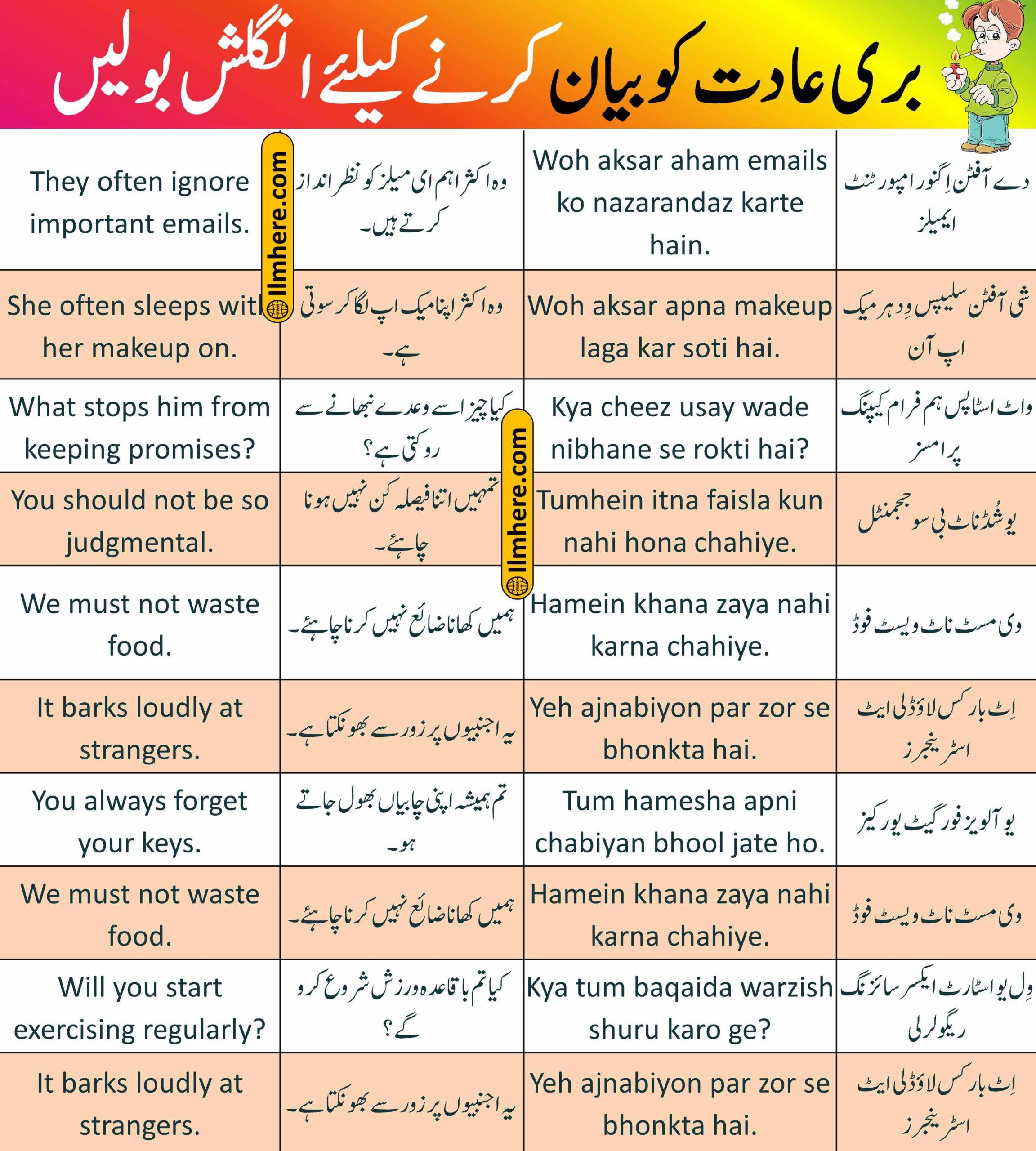
Conclusion
In conclusion, bad habits are behaviors we repeat without realizing their harmful effects on our lives. They can hinder us from reaching our full potential and living our best lives. Whether it’s procrastination, nail-biting, or overeating, breaking these habits is crucial for our physical, mental, and emotional well-being. Learning sentences about bad habits in both English and Urdu can help you express yourself better on this topic. Practicing these sentences can make it easier for you to discuss bad habits with others. Remember, it’s normal to make mistakes while learning. With practice and time, you’ll become more confident in speaking about bad habits in both languages.
Also Read,

